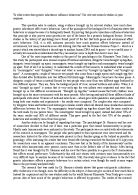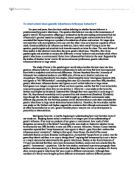Fessler explained that natural selection may have helped human ancestors to be captious with food to compensate for their higher susceptibility to disease. This behaviour would also help humans avoid diseases that could harm unborn offspring, and thus, threaten the species.
As the sample size of the study was large and the participants had a wide age range, it was able to be generalised to the wider public. It was well controlled as only 32 images were shown to each participant. Only healthy pregnant women were selected, thus eradicating any confounding factor of illness affecting responses. The data was quantitative as it was ranked via self-report, thus could be used for statistical analysis.
However, the findings cannot be solely based on evolution, as the environment could be an interfering variable. There is also cultural and emotional influences on women’s disgust. Since it was a quasi-experiment, the IV could not be manipulated. Data was ranked by self-report which is often unreliable due to individual differences in terms of food 'likes’ and 'dislikes’ and past food poisoning experiences will affect 'rankings’.
Fessler’s study supports that disgust may be an evolutionary behaviour as it may assist reproduction of offspring and protection against disease, thus having a greater chance of surviving or living a longer life, having children passing on genes to their offspring. Furthermore, the study provided evidence for women possessing the most powerful disgust mechanism in the first trimester, keeping in line with the theory of evolution since it is at this point that the immune system is its weakest (in order to protect the unborn baby). This leads to the conclusion that the women with the most active disgust mechanisms, survived long enough to pass down their genes through generations and therefore kept this mechanism prevalent.
An online questionnaire (internet survey) was conducted by Curtis et al (2004), which aimed to research whether there were patterns within people's disgust responses. In the survey, 77,000 participants for 165 countries were shown 20 images. For each image they were asked to rank their disgust, varying from disease relevant (using images with yellow and brown tones) and disease irrelevant images (using blue visual tones). However, the number of participants had decreased to 40,000, as the other 37,000 responses were disregarded since participants were accidentally exposed to the aim of the study having an impact on the validity of the participants' responses. The findings of the survey confirmed that disgust reactions were mostly illicit for those images that did threaten the immune system. The disgust reaction also decreased with age, meaning they were comparatively high in lower ages, and women had higher disgust reactions than men. This study validated the theory that disgust is an evolutionary behavior which plays a role in the protection of the immune system and did so through a financially economic online survey, further attaining higher reliability due to the large sample size. However, confirmation bias (Hayes, 2005) is present as it is difficult to empirically test some evolutionary based theories. A minor degree of gender bias is also present as a slightly larger percentage of females (50.3%) undertook the survey in comparison to males. Curtis et Al's study is also criticized due to the underestimation of nurturing, cultural and environmental influences on the responses.
The study of Curtis et Al (2004) supports the theory of evolution through its findings. The notion that women have a stronger reaction when compared to men helps shape our understanding of evolution since it is generally women that have a greater responsibility in reproduction and have a closer connection with the foetus, offering it protection and nutrition. Another point is that older people have decreased disgust reactions. This result fits in well, since older persons usually have a limited ability to reproduce (e.g.. menopause). It is also important to consider that a higher degree of experience can be associated with older participants meaning that they may have developed coping mechanisms and different approaches to problematic situations. In the case of Curtis et Al this has applications in that old people may not need to feel disgusted, but perhaps employ a different strategy to reap the benefits of the protection associated with it. These additional variables lead to the conclusion that there are a number of influences on our mechanisms of behaviour and the theory of evolution in psychology as a whole such as one's culture and environment. Both of these findings support the idea that the mechanism of disgust is a key factor in reproduction, thus supporting the theory of evolution.
In spite of such established evidence, there are some points to consider in examining the evolutionary there as a whole. Evolutionary theories can be considered as providing a reductionist explanation for complex ideas as they undermine the role of environmental factors in the gradual shaping of behaviour. Research based in the area of evolution is speculated since little is known about homo sapien human ancestors. Their behaviour is generally assumed, potentially decreasing the validity of research based on human evolutionary theories. Empirical testing in the field of evolution is quite restricted, causing a chance of the appearance of confirmation bias; the researcher observing that which they whish to observe. The presence of confirmation bias in evolutionary theories is strongly supported by Hayes (2005). Stephen Rose (2005) states that evolutionary psychology has a "Flintstone" approach in analysing mankind. This means that evolutionary explanations focus too much on the past and don't take into account the modern world and its changes. However, the concept of "genome lag" is brought by evolutionary psychologists as reasoning for this approach. This is also referred to as both genetic determinism and genetic reductionism.
In summation, evolution is the theory that the organisms with traits that are most adapted to an environment and therefore 'fittest' are selected for through Natural Selection. This theory was initially proposed by Charles Darwin. In psychology, the focus is on the mechanisms of behaviour or the biological factors which dictate the expression of behaviour and their changes rather than the behaviours themselves. The way in which these mechanisms are investigated is outlined in the research of Fessler (2006) and Curtis et Al (2004), who focused on the mechanisms of the emotion of disgust. Their results have applications in the universal theory of emotions of both Ekman and Charles Darwin. They are especially pertinent since Edman had initially disagreed with evolutionary theories but is now convinced that there exist 6 universal emotions, one of which is disgust. The research of Curtis suggests that disgust is an emotion which has existed as a product of the human genome for centuries, serving as a shield from danger. This concept is further elaborated by Fessler who suggests that pregnant women experience disgust to protect their foetus from harmful or infected foods which may evoke disgust within the mother. The mechanism of disgust is validated by a considerable amount of evidence, leading to the conclusion that it plays an important role in human survival and has evolved over millions of years. However, the influence that the environment has on this mechanism should't be underestimated as there exist many particularities in terms of disgust for a wide range of cultures e.g.. vegemite in the Australian culture.







